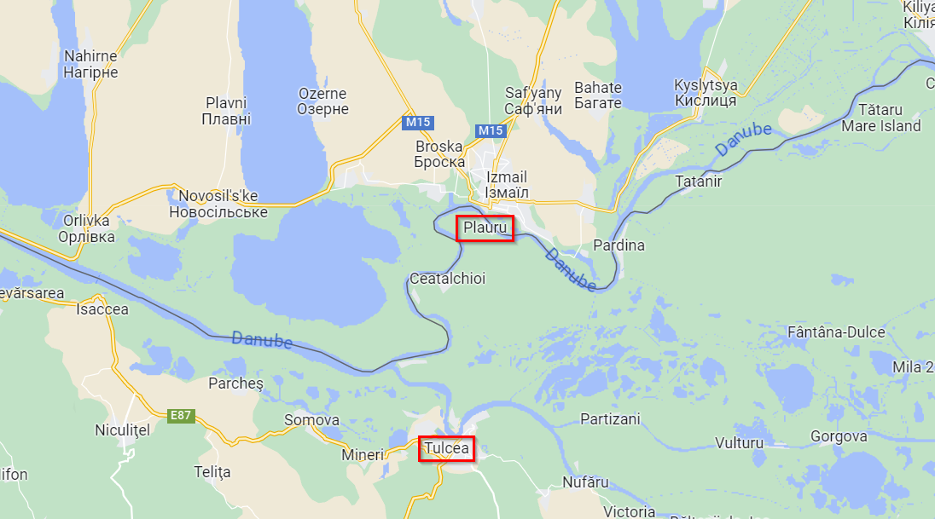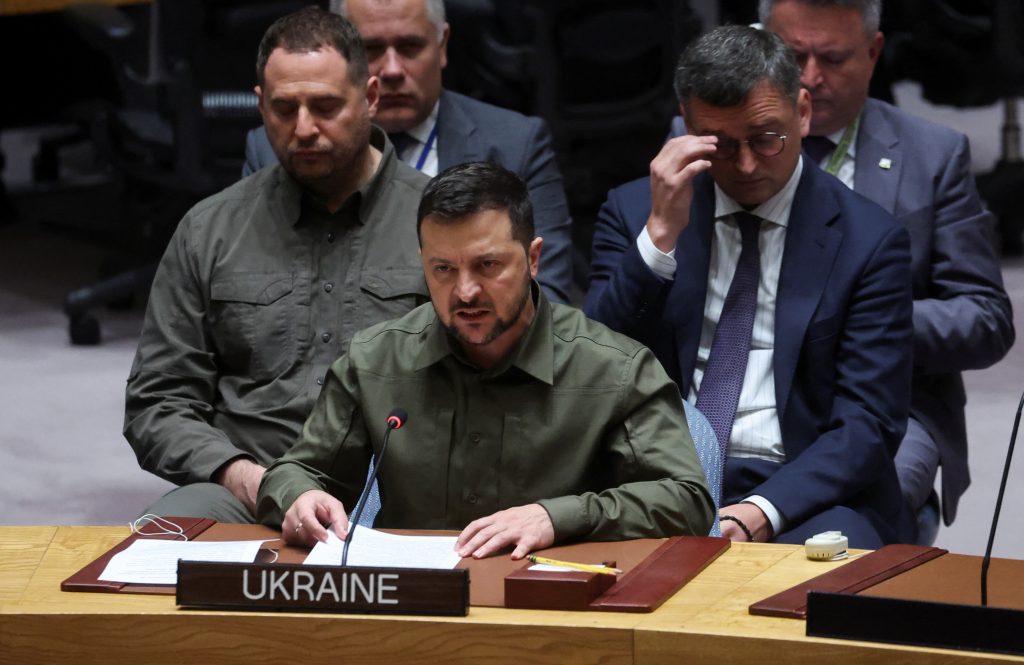As Russia continues its assault on Ukraine, the Atlantic Council’s Digital Forensic Research Lab (DFRLab) is keeping a close eye on Russia’s movements across the military, cyber, and information domains. With more than seven years of experience monitoring the situation in Ukraine—as well as Russia’s use of propaganda and disinformation to undermine the United States, NATO, and the European Union (EU)—the DFRLab’s global team presents the latest installment of the Russian War Report.
Security
Zelenskyy expresses frustration with allies over grain imports during UN speech
Romania increases security measures after possible drone remains found on its territory
Media policy
Russia seems unlikely to block YouTube without a domestic alternative
International affairs
US targets individuals and entities for sanctions evasion
Zelenskyy expresses frustration with allies over grain imports during UN speech
As Ukraine’s counteroffensive continues in the direction of Bakhmut, President Volodymyr Zelenskyy said in his September 19 speech at the United Nations General Assembly (UNGA) that Russia’s war against Ukraine threatens global security as the Kremlin weaponizes global energy and food supplies. Zelenskyy stated that by blocking Ukraine’s grain exports and attacking ports, Moscow seeks to deepen global food shortages and blackmail nations into recognizing Russia’s conquest of Ukrainian territory. In a recent overnight attack, the Russian army used drones to strike the Izmail region of Odesa on September 13, injuring six civilians and damaging the port and other civil infrastructure.
The Ukrainian president criticized Kyiv’s allies that continue to block Ukraine’s grain imports despite the already dire situation caused by the Russian blockade. Though Zelenskyy did not name any countries, Poland, Slovakia, and Hungary have said they will keep restrictions on Ukrainian grain imports despite the EU’s decision not to prolong the ban.
On September 20, the Atlantic Council honored Zelenskyy with a 2023 Global Citizen Award.
Meanwhile, Ukrainian Minister of Infrastructure Oleksandr Kubrakov announced on September 19 that the bulk carrier Resilient Africa, sailing under Palau’s flag and loaded with three thousand metric tons of wheat, left the Black Sea port of Chornomorsk for the Bosphorus. Resilient Africa and the cargo vessel Aroyat are the first civilian ships to agree to enter Ukrainian ports following Russia’s withdrawal from the Black Sea Grain Initiative in July. After Russia withdrew, it threatened to attack ships operating in Ukrainian maritime space. Resilient Africa and Aroyat are expected to deliver twenty thousand tons of grain to countries in Africa and Asia. According to Kubrakov, Aroyat remains in Chornomorsk port, loading Ukrainian wheat bound for Egypt.
Zelenskyy warned other nations at UNGA that Russian military actions will threaten more areas of the world. This resonates with recent developments in the Black Sea region, where Russian naval and military operations continue to escalate and increasingly approach the waters of NATO countries Romania and Bulgaria. The recent Ukrainian attack on Sevastopol on September 14 was carried out in conjunction with an attack on patrol vessels near Bulgaria’s economic zone. The Telegram channel of military blogger Rybar shared a map speculating that Ukrainian forces used Bulgarian and Romanian waters for the attack.
The hacker group KillNet claimed responsibility for an attack against Bulgaria’s banking system. It said the attack was motivated by Bulgaria’s decision to lift the ban on grain exports from Ukraine. Pro-Russian Telegram channels in Bulgaria expressed support for the attack. Meanwhile, on September 17, Bulgarian authorities found drone remains near Tyulenovo, a strategic location on the coast. While there is insufficient evidence to determine the drone’s origin and why it was in the area, the event provoked media reactions and commentary about the possibility that the war in Ukraine could spill into neighboring areas. The incident received attention on pro-Russian Telegram channels that speculated the drone was a kamikaze-type Ukrainian UAV. Citing comments made by Bulgarian authorities, Ukrainian Telegram channels suggested that the wreckage contained an 82mm mortar shell.
—Ruslan Trad, resident fellow for security research, Sofia, Bulgaria
Romania increases security measures after possible drone remains found on its territory
On September 13, near the city of Tulcea, the Romanian army identified possible drone fragments located a few hundred meters away from a military base. The discovery occurred after local residents reported an explosion to emergency services following Russian attacks on Ukrainian ports along the Danube River on the night of September 13. This is the third time in the last two weeks that suspected drone fragments have been found on Romanian territory. The first two drones were located in the Plauru village of Tulcea County, situated in close proximity to the Ukrainian border. However, the third drone was discovered deeper in Romania, approximately in twenty-five kilometers from the Ukrainian border.

According to Romania’s Ministry of Defense, preliminary results indicated the fragments found near Tulcea appear to originate from a “drone similar to those used by the Russian military.” An investigation is underway to uncover more details.
On September 18, Minister of National Defense Angel Tîlvăr met with officials from defense, public order, and national security committees. Later, the defense ministry announced that Romania had increased the number of military personnel in the Danube Delta region due to the heightened drone attacks near Romania. Approximately six hundred soldiers will be sent to the border to monitor the Danube shore from Galați to Sulina. Additionally, the ministry said it would deploy more observation points and ground sensors, and increase the number of river fleet patrols on the Danube.
Romania has also initiated the construction of anti-aircraft shelters for residents living near the Ukrainian border in response to Russia’s repeated violations of its national territory.
—Victoria Olari, research assistant, Moldova
Russia seems unlikely to block YouTube without a domestic alternative
Citing Russian media outlet Interfax, Riga-based independent Russian media outlet Meduza noted on September 17 that Russia does not plan to block YouTube until the Kremlin finds an “adequate replacement.”
Interfax reported that Alexander Khinshtein, chairman of the State Duma Committee on Information Policy, said that as of now there is no full-fledged domestic alternative to YouTube, and “premature blocking of the platform might negatively impact users who will become hostages of the situation.”
Russian Member of Parliament Anton Gorelkin said that Russia should develop its own alternative, “as YouTube remains a hostile platform deliberately violating” Russian laws. He added that YouTube could one day pursue “a more aggressive policy” to distribute videos Russia considers illegal. He added that Russian YouTubers have “no future.”
Last month, a Russian court fined YouTube’s parent company Google for not deleting videos about the war in Ukraine that the Kremlin alleges are false.
Following Russia’s 2022 invasion of Ukraine, Russia blocked and banned several Western social media platforms and online outlets but allowed YouTube to remain accessible. In 2021, there were approximately 91 million Russian YouTube users, while Russia’s existing domestic alternative, RUTUBE, had only three million users. YouTube’s dominance in Russia and public support for the platform are likely why the Kremlin has approached its potential restriction cautiously.
The DFRLab has previously covered Russia’s attempts to introduce domestic replacements for popular Western online services, including Wikipedia, Instagram and various Google products.
—Eto Buziashvili, research associate, Tbilisi, Georgia
US targets individuals and entities for sanctions evasion
On September 14, the United States imposed sanctions on more than 150 individuals and entities from Russia, Turkey, Georgia, and the United Arab Emirates. The US implemented the sanctions in response to Russia’s ongoing war of aggression against Ukraine, targeting various sectors of Russia’s economy and entities involved in crucial energy projects and infrastructure.
Among the sanctioned are Russian companies participating in developing energy projects, such as Russia’s Arctic LNG 2 liquefied natural gas project, and associated companies procuring essential materials and advanced technology. The United States also designated companies operating within the metals and mining sector as well as entities that offer repair and maintenance services to the Russian defense sector.
The sanctions also targeted Russian malign influence in Georgia. The United States sanctioned Otar Partskhaladze, a former prosecutor General of Georgia it described as a “Georgian-Russian oligarch,” alongside Aleksandr Onischenko, a Russian Federal Security Service (FSB) officer. Partskhaladze has close ties to former prime minister Bidzina Ivanishvili, the billionaire founder of the ruling party, Georgian Dream; the corruption monitoring organization Transparency International described Ivanishvili as “the informal ruler of Georgia.” In its sanctions announcement, the US Department of State noted, “Onishchenko and the FSB have leveraged Partskhaladze to influence Georgian society and politics for the benefit of Russia. Partskhaladze has reportedly personally profited from his FSB connection.”
The sanctions also included five Turkish ship repair and construction companies working on “vessels that have been blocked as property of entities operating or having operated in the defense and related materiel sector of the Russian Federation economy.” Additionally, the United States imposed sanctions against Pavel Shevelin, an individual affiliated with the Wagner Group, for facilitating the shipment of munitions from North Korea to Russia.
The latest round of sanctions was part of a broader international effort, with the United States and its allies having previously imposed extensive sanctions on Russia following its invasion of Ukraine in February 2022.
—Sopo Gelava, research associate, Tbilisi, Georgia
Image: Ukraine's President Volodymyr Zelenskiy looks across the room towards Russia's Ambassador to the United Nations Vasily Nebenzya as Zelenskiy addresses the United Nations Security Council during a ministerial level meeting of the Security Council on the crisis in Ukraine at U.N. headquarters in New York, September 20, 2023. REUTERS/Mike Segar
